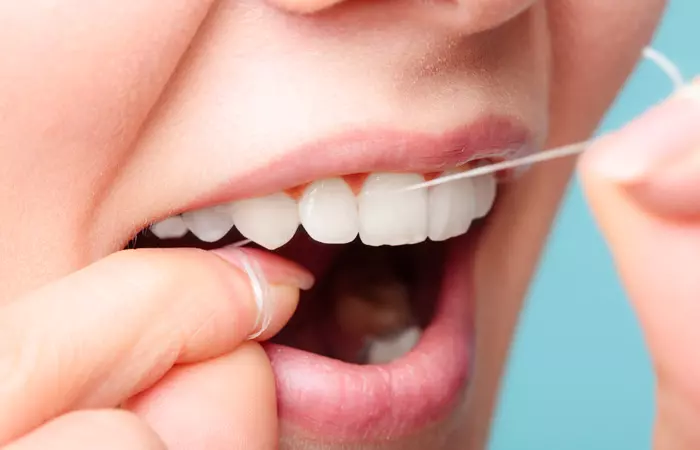What Is Morning Breath And 5 Ways To Break Free From It

Image: Shutterstock
Most of us can relate to the feeling of waking up with a less-than-fresh feeling or morning breath in our mouths. This is caused by the buildup of bacteria in the mouth that produces foul-smelling gasses. Understanding the causes behind morning breath is the first step in learning how to combat it effectively. In this article, we will delve into the science behind morning breath and explore practical tips and habits to help you avoid this. Read on to know more!
In This Article
Reasons Behind Morning Breath
Morning breath is a common phenomenon that can leave us feeling self-conscious and uncomfortable as we start our day. The primary reason behind this unpleasant smell is the drying out of the mouth during sleep, resulting in reduced saliva production. This dry environment becomes an ideal breeding ground for bacteria, which release foul-smelling gasses.
Several other factors can contribute to morning breath. People who breathe through their mouths or snore at night are more susceptible to it. Additionally, certain medications, commonly taken by the elderly, may exacerbate the issue. Allergies can also play a role, as mucus buildup in the throat becomes a food source for bacteria. Moreover, insufficient oral hygiene practices can lead to bacterial growth. Even the foods we consume before bedtime can leave a lasting impact on our breath, with strong-smelling foods like onions, garlic, and spices becoming culprits for morning breath woes.
Understanding the various causes of morning breath empowers us to take proactive steps in combating it. By adopting better oral hygiene habits, avoiding certain foods before sleep, and seeking remedies for dry mouth, we can wake up feeling fresher and more confident, ready to face the day ahead.
How To Fight Morning Breath
1. Brush Your Teeth Thoroughly
When it comes to maintaining oral hygiene and combating morning breath, regular and thorough brushing is of paramount importance. Aim to brush your teeth for at least two minutes using fluoride toothpaste. This duration allows enough time to effectively remove plaque, food particles, and bacteria from the surfaces of your teeth. After brushing, resist the temptation to snack or consume beverages, as this can lead to further bacterial growth during the night.
2. Don’t Neglect Your Tongue
While brushing your teeth is essential, many people overlook the importance of brushing their tongues. A significant portion of the bacteria responsible for bad breath resides on the surface of the tongue. By gently brushing your tongue with a toothbrush or using a dedicated tongue scraper, you can remove these bacteria and prevent their proliferation. This simple step can make a significant difference in controlling morning breath and promoting better oral health.
3. Embrace Flossing
Flossing is a crucial step in your oral care routine, as it reaches areas between the teeth and along the gumline that toothbrushes cannot access. These tight spaces often trap food particles, leading to bacterial growth and bad breath. By flossing regularly, especially before bedtime, you can effectively remove the hidden debris, reducing the chances of morning breath.
4. Stay Hydrated With Water
Drinking an adequate amount of water throughout the day not only supports overall health but also plays a vital role in managing morning breath. Staying hydrated encourages saliva production, which helps neutralize acids in the mouth and wash away food particles and bacteria. Opt for pure water rather than sugary or acidic beverages, as they can contribute to an unhealthy oral environment.
5. Choose The Right Mouthwash
Mouthwash can be a valuable addition to your oral care routine in controlling morning breath. Select a mouthwash with antibacterial properties and follow the instructions on the package carefully. The recommended swishing duration, typically around 30 seconds, is crucial for the mouthwash to effectively kill bacteria and freshen your breath. However, be cautious of mouthwashes containing alcohol, as they can contribute to dry mouth, exacerbating the issue.
6. Include Healthy Greens In Your Diet
Foods that contain chlorophyll, such as parsley, basil, mint, or cilantro, offer a natural remedy for combating bad breath. Chlorophyll acts as a deodorizer and helps neutralize foul-smelling compounds in your mouth. Incorporate these greens into your meals or chew on fresh herbs after eating pungent foods to help fight off the lingering odors.
By incorporating these tips into your daily routine, you can take control of your morning breath and enjoy a fresher and more pleasant start to your day. Remember, maintaining good oral hygiene and making healthier lifestyle choices contribute not only to a more confident smile but also to overall dental well-being. So, what is your secret to having fresh breath in the morning? Let us know in the comments section!


























